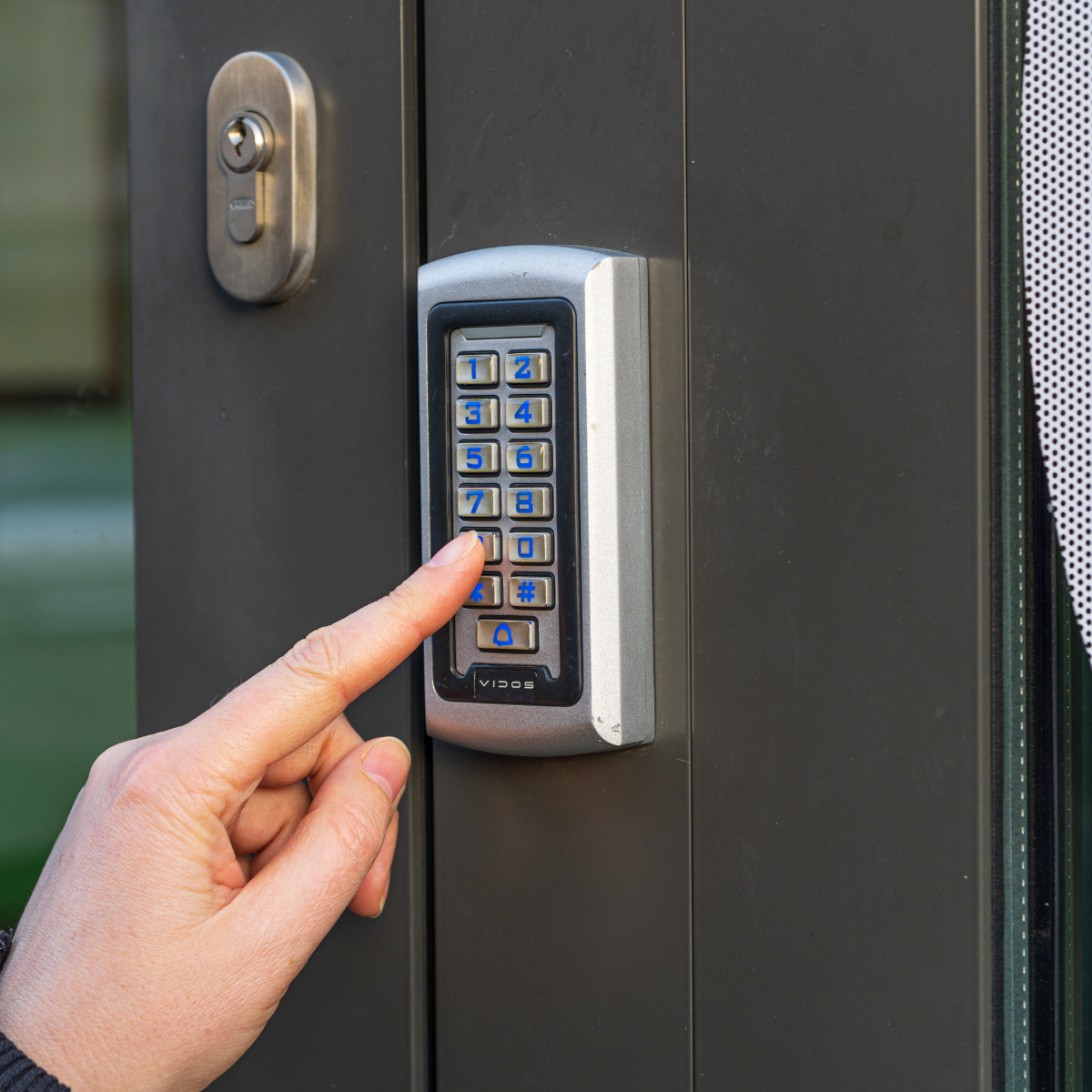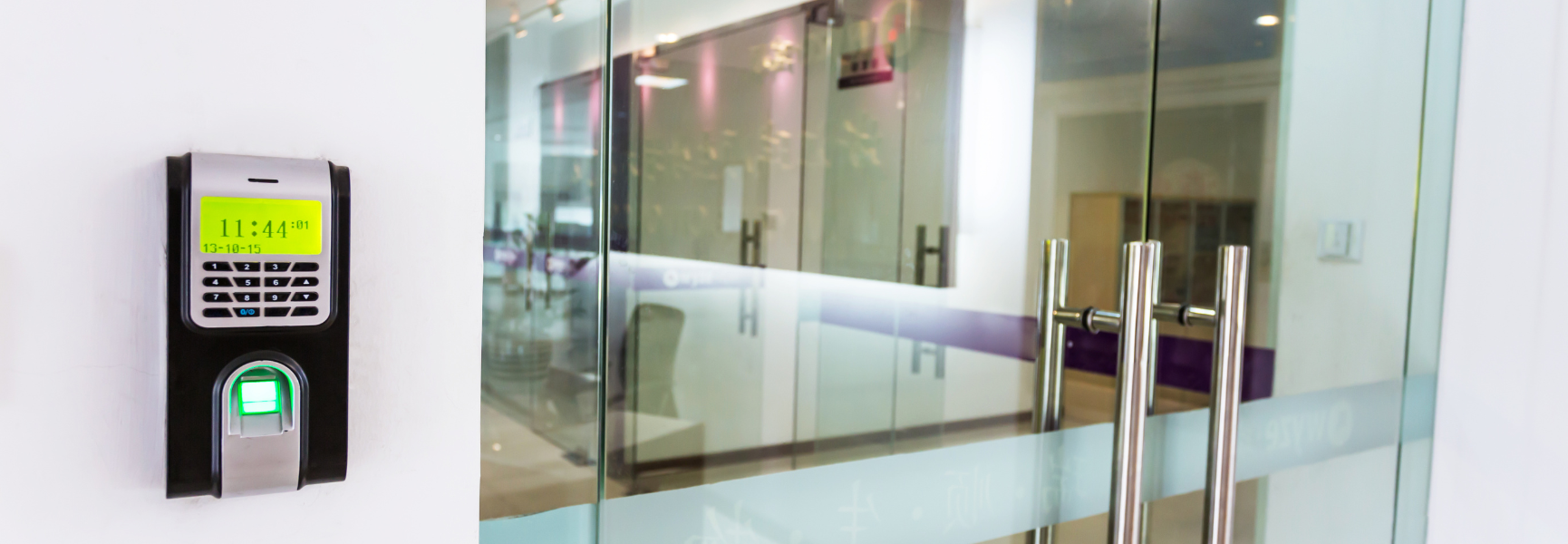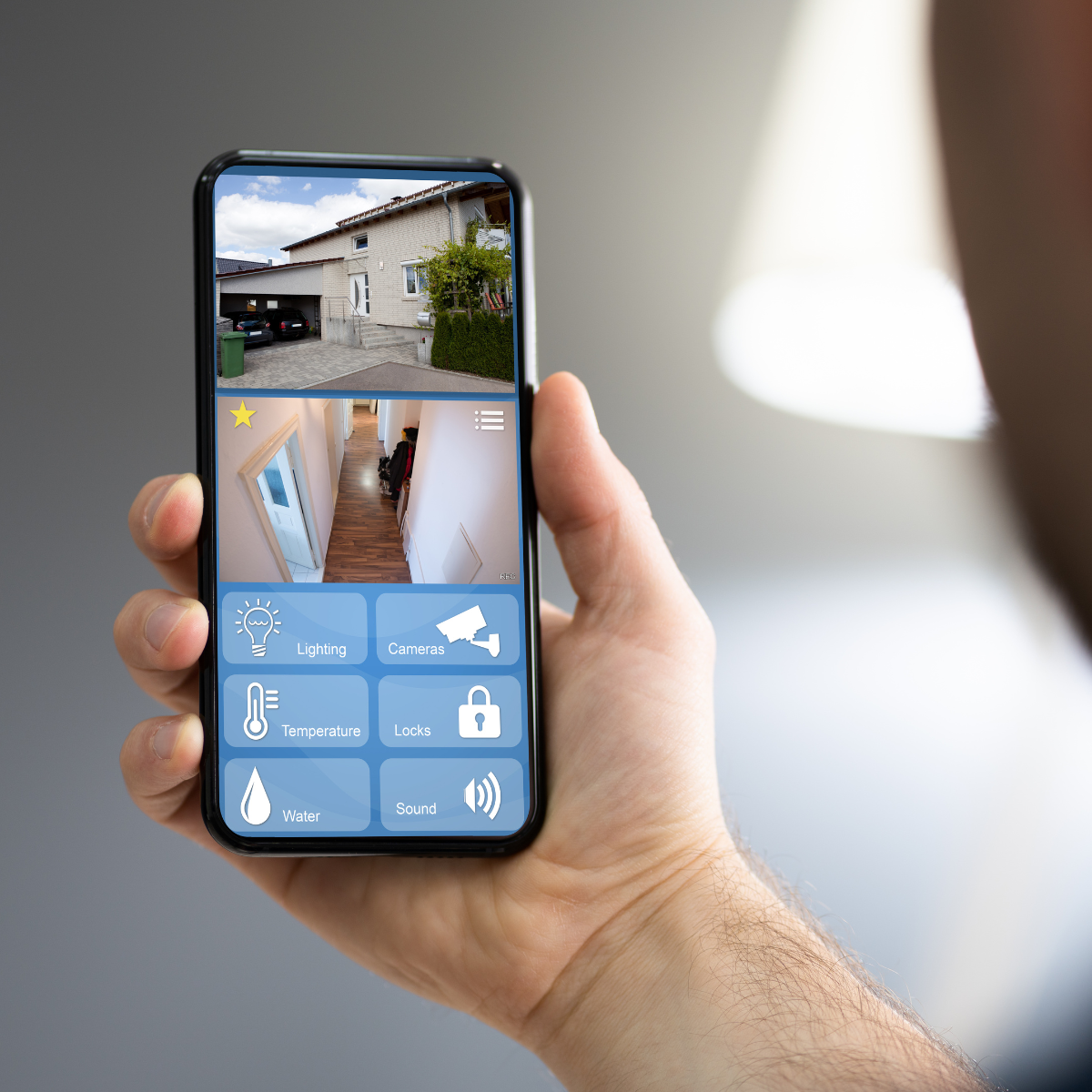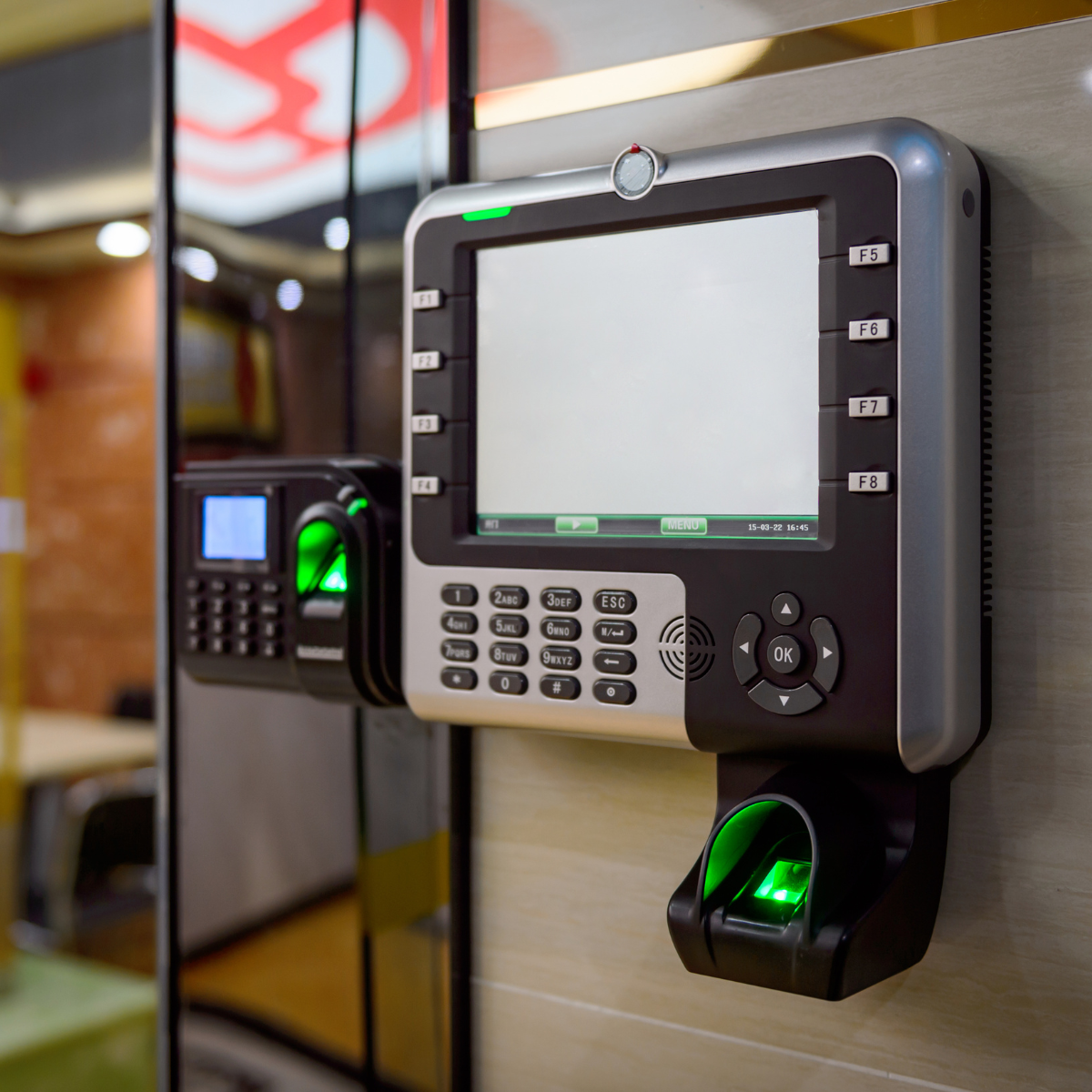Access control security systems play a key role in safeguarding places of work, assets, personnel and sensitive information. These systems range from simple keypad entry solutions to sophisticated biometric access control systems. Understanding what these systems are and how they work can help businesses choose the right access control solutions to meet their security needs.
What is Access Control System Security?
Access control system security refers to the mechanisms and processes designed to regulate who can enter or exit a building. These can also be installed in designated rooms or areas. These systems can be as simple as traditional lock and key or as advanced as biometric scanners. These more advanced scanners require the use of fingerprints, facial recognition or even iris scans. The primary objective of access control systems is to provide a safe and secure environment by ensuring that only authorised individuals can gain entry.
Types of Access Control Systems
Keypad Systems
Keypad systems require users to enter a code to gain access. This is a very common and cost effective solution. This type of access control system is especially suitable for small businesses or internal office doors. However, the security of keypad systems can be compromised if codes are shared among employees or forgotten. It is imperative to regularly update codes and practice good code management when using keypad systems. Despite these drawbacks, keypad systems remain popular due to their simplicity and ease of installation.

Card-Based Systems
Card-based systems use key cards or fobs that are swiped or tapped against a reader to gain access. These systems offer better security than keypad systems since they eliminate the need for users to remember codes. Additionally, they can be easily managed and deactivated if lost or stolen, preventing unauthorised access. Card-based systems also allow for different levels of access, enabling administrators to control who can enter specific areas within a facility. This flexibility makes them a preferred choice for many businesses.
Biometric Systems
Biometric systems use unique biological traits such as fingerprints, facial recognition or retina scans. These help to verify an individual’s identity and therefore allow them to enter. These systems provide a high level of security since the credentials are unique to each individual and difficult to replicate. Biometric systems are increasingly popular in high security environments where traditional methods may not be sufficient. They offer a seamless and quick access experience, reducing the need for physical tokens or codes. However, biometric systems can be more expensive and may require more maintenance. They also require extensive user education to ensure proper use and privacy protection.
Turnstile Access Control Security Systems
Turnstile access control security systems integrate turnstiles with access control. This provides a physical barrier that requires authorisation to pass through. These systems are particularly effective in high traffic areas, such as office lobbies, stadiums and transportation hubs. By installing turnstile access control security systems, it ensures that only one person can enter per credential used. Turnstiles can be combined with card readers, biometric scanners or keypad systems to enhance security further. They are designed to withstand heavy use and can be a visual deterrent to potential intruders. Therefore this makes them an excellent choice for facilities where controlled access and flow are critical.
Smart Access Control Systems
Smart access control systems represent the cutting edge of security technology. They offer a seamless blend of convenience, efficiency and enhanced security. These systems integrate advanced technologies such as IoT, AI and cloud computing to provide real time monitoring. They also provide benefits such as remote management and have predictive maintenance capabilities. Users can access facilities through their smartphones, biometric identifiers or smart cards, significantly reducing the risk of unauthorised entry. Smart access control systems can also learn and adapt to usage patterns, optimising security protocols and reducing operational costs.
Benefits of Access Control Security Systems
Implementing access control security systems offers numerous advantages. Firstly, they provide enhanced security. They help to restrict access to authorised individuals only. In turn, this reduces the risk of theft, vandalism and unauthorised entry. This is particularly important for protecting sensitive areas such as data centres, executive offices and storage rooms with valuable assets.
Access control security systems are also highly convenient. Automated systems streamline access management, eliminating the need for physical keys and the associated risks of losing them. This also simplifies the process of granting and revoking access rights. This can be done quickly and efficiently through a centralised system.
Access control systems can be a fantastic way to keep audit trails. They often come with logging features, providing a record of who accessed which areas and when. This is crucial for monitoring and investigative purposes. It helps to identify any security breaches or unauthorised access attempts. The audit trail can also be used to ensure compliance with security policies and regulations.
Modern systems can easily scale with the growth of a business, adding new users and access points as needed. This makes access control solutions adaptable to changing security requirements. Whether it is expanding to new office locations or upgrading to more advanced technologies.
Access Control Solutions from OHEAP
When it comes to choosing a reliable provider for access control solutions, OHEAP stands out as a leader in the industry. With over 30 years of experience, OHEAP has built a reputation for delivering high quality, British made security products. OHEAP has an extensive range of access control security systems, all designed to meet the needs of businesses of all sizes. They can cater for small offices to large commercial complexes.
Why Choose OHEAP?
- Products Made in Britain:
OHEAP’s commitment to quality is evident in their range of British made products. This ensures that their systems meet stringent UK standards and are built to last. By choosing British made products, businesses can support the local economy and benefit from superior craftsmanship and reliability. - NSI Gold Accredited:
Accreditation by the National Security Inspectorate (NSI) Gold standard is a mark of excellence in the security industry. It signifies that OHEAP adheres to the highest standards of quality and service. They provide customers with peace of mind that they are investing in a trusted and reputable security solution. - 24/7 Call Out Facility:
Security needs do not stick to business hours. OHEAP offers a 24/7 call out facility, ensuring that help is available whenever it is needed. This rapid response capability is crucial for addressing any security issues or system malfunctions promptly. Therefore, minimising downtime and maintaining the integrity of the access control system.
- Tailored Solutions:
OHEAP understands that every business has unique security requirements. They provide customised access control solutions to meet specific needs. For instance, they can help with single door entry systems or a more complex network of biometric access points. Their expertise allows them to design and implement systems that are both effective and user friendly. Therefore, ensuring maximum security without compromising convenience.

Implementing Access Control Systems
Choosing and implementing the right access control security system involves several steps. Firstly, you must assess the security requirements of your premises. Consider factors such as the number of access points, the level of security needed and the type of users. Secondly, it is time to select which type of system you need, based on the assessment. For high traffic areas, turnstile access control security systems might be ideal, whereas smaller offices might benefit from keypad or card-based systems.
Next up, get a professional to install the security systems. It is extremely important to use an expert for this to ensure the effective functioning of the system. OHEAP’s experienced technicians ensure that the systems are installed correctly and efficiently. They will take into account the layout and specific needs of the premises. Finally, once the system is installed, it is essential to train users on how to operate it. You may need to schedule some time to educate your staff. Furthermore, ensure you establish a regular maintenance plan to ensure it remains functional and secure. OHEAP offers comprehensive training programmes and ongoing support to help businesses get the most out of their access control solutions.
The Future of Access Control Security Systems
The landscape of access control security systems is continually evolving, driven by technological advancements. Here are a few trends that are shaping the future.
Integration with Other Systems
Modern access control solutions are increasingly being integrated with other security systems such as CCTV, alarm systems and building management systems. This integration provides a comprehensive security solution, enhancing overall safety and efficiency. For instance, an integrated system can automatically trigger CCTV cameras to record when a door is accessed or when an alarm is triggered. This ensures that all security events are captured and monitored in real-time.
Additionally, integrating access control with building management systems can streamline operations such as HVAC and lighting. This allows these systems to adjust based on occupancy detected by access controls. This not only enhances security but also contributes to energy efficiency and operational cost savings.
Mobile Access Control
With the rise of smartphones, mobile access control is becoming increasingly popular. Users can unlock doors using their mobile devices, providing a convenient and secure way to manage access. Mobile credentials can be issued and revoked instantly, making it easy to manage access permissions without the need for physical key cards. This is particularly useful for organisations with a high turnover of staff or frequent visitors.
Furthermore, mobile access control can enhance security through features like biometric authentication (fingerprint or facial recognition) on the smartphone itself. This adds an additional layer of security. Mobile devices can also leverage location services to grant access only when the user is physically present at the door, further reducing the risk of unauthorised entry.

Cloud-Based Solutions
Cloud-based access control systems offer flexibility and scalability. They allow remote management and monitoring. This makes it easier for businesses to oversee security across multiple locations. Administrators can manage access permissions, monitor system status and generate reports from any location with internet access. This is particularly advantageous for businesses with geographically dispersed sites, such as retail chains or multinational corporations.
Artificial Intelligence
AI is being used to enhance the capabilities of access control systems. From facial recognition to predictive analytics, AI can improve security measures and streamline operations. Facial recognition technology, powered by AI, can identify individuals with high accuracy and speed. This makes it ideal for high-security environments.
AI algorithms can also analyse access patterns to detect unusual or suspicious behaviour, such as an employee attempting to access a restricted area at odd hours. These predictive analytics can trigger alerts for security personnel to investigate potential threats before they materialise.
Enhanced User Experience
As technology advances, the focus is also on improving the user experience. Access control systems are becoming more user-friendly, with intuitive interfaces and seamless interactions. Touchless access control, which became particularly important during the COVID-19 pandemic, allows users to gain entry without physically touching any surfaces. This helps to reduce the risk of contamination and the spread of germs. Voice recognition and gesture-based controls are other innovations that can enhance the user experience while maintaining high security standards.
Cybersecurity
With the increasing reliance on digital systems, cybersecurity has become a critical aspect of access control security. Ensuring that access control systems are protected against cyber threats is paramount. Modern systems are being designed with robust encryption, multi-factor authentication and regular security updates to protect against hacking attempts.
Conclusion
Access control security systems are an essential component of modern commercial security strategies. They provide robust protection against unauthorised access and help maintain a secure environment for businesses and their assets. Companies like OHEAP, with their extensive experience and high quality British made products, are invaluable partners in implementing effective access control solutions.
Whether you require a basic set up for your entry system or want an advanced access control security system, investing in the right access control solutions is vital. By staying informed about the latest trends and technologies, and choosing a reputable provider like OHEAP, you can ensure that your security measures are both effective and future proof.
